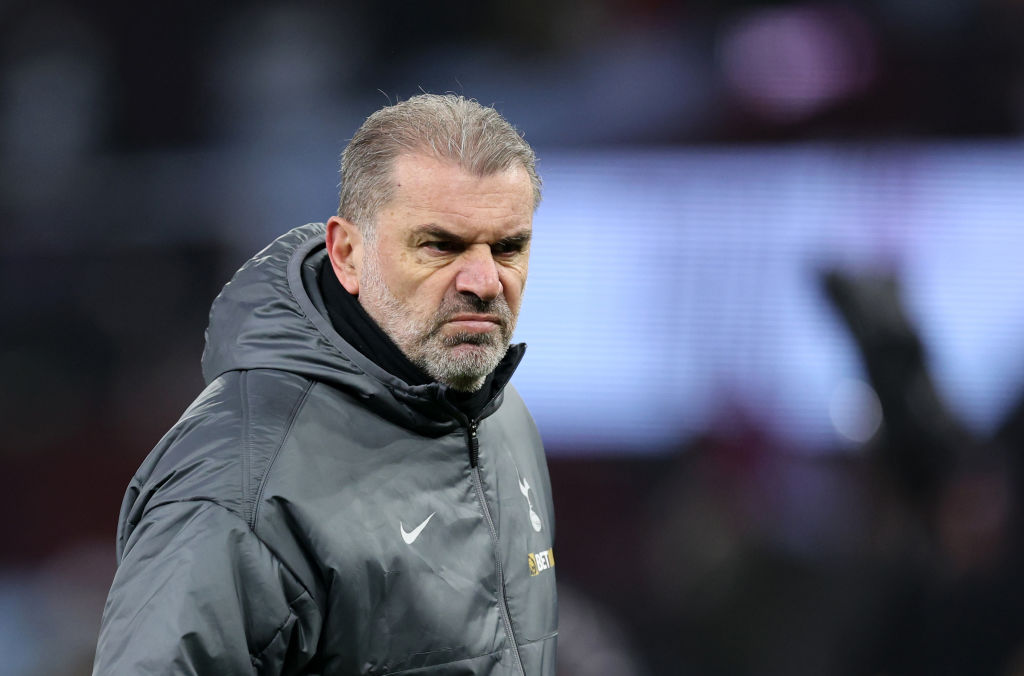What Arsenal’s win over Bournemouth said about their title chances
Seb Stafford-Bloor was at the Emirates Stadium to see the Gunners’ far-from-perfect 3-1 win over Bournemouth
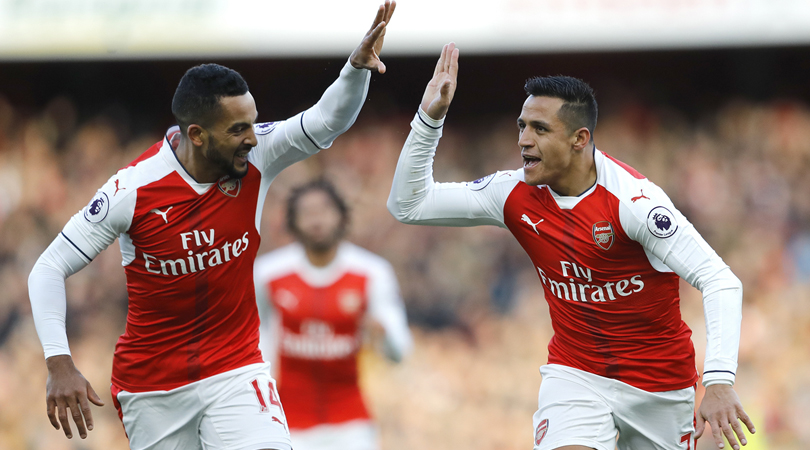
Summer has turned to autumn, autumn to winter and, still, Arsenal remain unbeaten. The memory of that chaotic opening-day defeat to Liverpool continues to dim and, with each passing week, their title ambitions seem more realistic.
Or, do they?
While it would be contrary to deny that Arsenal have been impressive since the middle of August, it would be equally as reductive to pretend that, at times, they haven't shown some frailties. Had it not been for Edinson Cavani's wayward finishing in midweek, PSG might have ended the unbeaten sequence and, days earlier, they had been a late Olivier Giroud header away from defeat at Old Trafford. They wobbled at home to Tottenham in early November, were frustrated at the Emirates by Middlesbrough in late October, and have typically only been impressive in an unconvincing, superficial way.
Cherry crush
This is November in Arsenal world. Football amplifies its mini-trends but, in this instance, it's difficult to ignore the symmetry of their struggles
Bournemouth are in a hard-to-define territory. Capable of being excellent (wins over Everton and Stoke) and fairly dismal (losing at home to Sunderland), their second season in the Premier League is proving similar to the first.
They've improved, but the lights at some grounds remain a little bright for Eddie Howe's team and they are still prone to treating their trips to bigger stadiums as days out. At home they're often an admirable blend of purpose and commitment, playing watchable football with a blue-collared edge, but on their travels their knees do tend to buckle at crucial moments. The Cherries’ two trips to Manchester this season produced an aggregate of seven goals conceded and one scored and, though it shouldn't detract from his general accomplishment, Howe has work to do to rid his side of their last traces of inferiority.
What kind of test did they provide on Sunday? An inconclusive one. Bournemouth's bottom lip trembled inside 12 minutes, with Steve Cook selling Adam Federici short with a backpass and allowing Alexis Sanchez to steal in to open the scoring.
Get FourFourTwo Newsletter
The best features, fun and footballing quizzes, straight to your inbox every week.
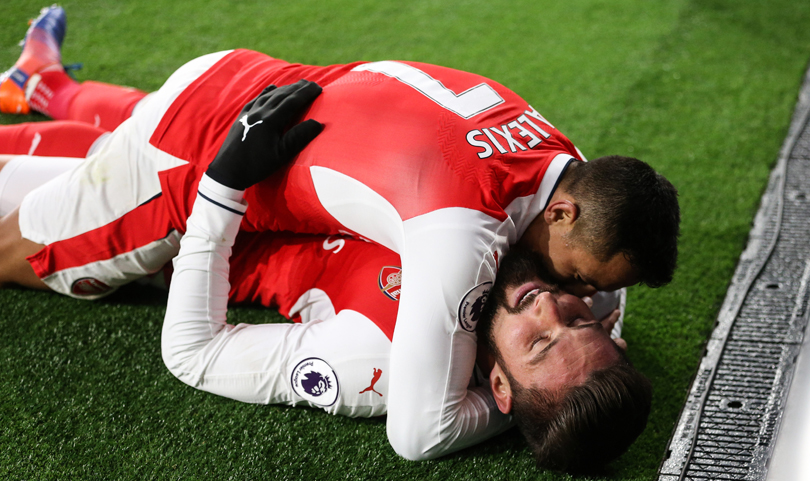
It was the ideal gift for a patchwork Arsenal, who had the rarely-seen Mathieu Debuchy starting in place of the injured Hector Bellerin, Granit Xhaka partnering Mohamed Elneny in midfield, and Theo Walcott and Alex Oxlade-Chamberlain lining up either side of Mesut Ozil. Debuchy, cruelly after such a long absence, limped off after 15 minutes and was replaced by Gabriel – and the change further disrupted an Arsenal already lacking in rhythm. Minutes later, Callum Wilson was felled by a Nacho Monreal challenge euphemistically described as "shoulder-to-shoulder" by Arsene Wenger and, improbably, Bournemouth were level from the penalty spot.
Naughty November
This is November in Arsenal world. Football amplifies its mini-trends but, in this instance, it's difficult to ignore the symmetry of their struggles; since arriving in this country, Wenger's points-per-game average in November is significantly lower than in any other month of the season. It's an anomaly and one for which there isn't a convincing explanation, but it's still real. That average isn't marginally lower – it's significantly so.

We ran the numbers so you don't have to: Revealed! What are Premier League clubs' best and worst months?
Injuries have been a factor in the recent malaise and Santi Cazorla's long-term absence has restricted their ability to penetrate lines and establish a productive midfield rhythm. However, hackneyed remark though it may be, Sunday was illustrative of a more traditional Arsenal weakness: the penalty equaliser rocked the hosts and exposed the fragility which never seems far from the surface.
Bournemouth's ability to get to the byline could be explained by the forced defensive change and resulting awkwardness, but the slow and ponderous passing which characterised the rest of the half could not. This was a team who have been praised so often for their fluidity that it was shocking to see the effects of a bruised ego.
Powerhouse teams are typically at their most venomous after being wounded, but Arsenal have a tendency to retreat and lick their wounds. Post-game, Wenger even acknowledged that his side had become "nervous" and that he had needed half-time to address the negativity brought on by recent form.
It worked, too. After the break Walcott would restore the lead, heading in at the back post after a smart Monreal cutback. However, while it soothed the crowd's anxieties, it was more descriptive of Bournemouth's shortcomings than any decisive Arsenal response: Oxlade-Chamberlain was allowed to drift around the back of a static defence and Walcott was left generously unmarked inside the six-yard box.
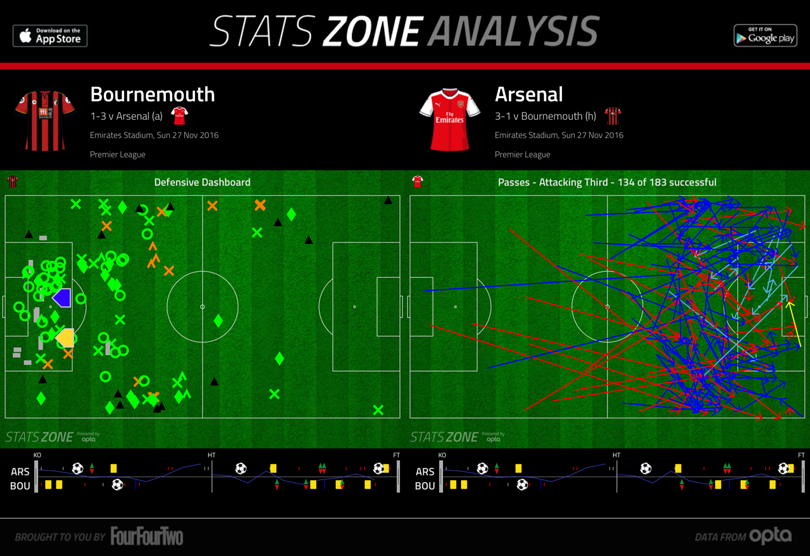
Midfield bother
The problem area remains the central-midfield spot. Without Cazorla, Arsenal lack any real variation. In their own right Elneny and Xhaka are fine players, but as a combination they are prohibitively two-dimensional and help to create an over-reliance on the forward players.
In other departments of the game, both were very efficient on Sunday and Xhaka was defensively excellent, but the lack of invention was a persistent speed bump, as was the inability to regularly equip Ozil, Sanchez or either of the wide players with the right sort of possession. They hurt teams when they're played into space and, yet, for much of the game were forced to play in congested areas.
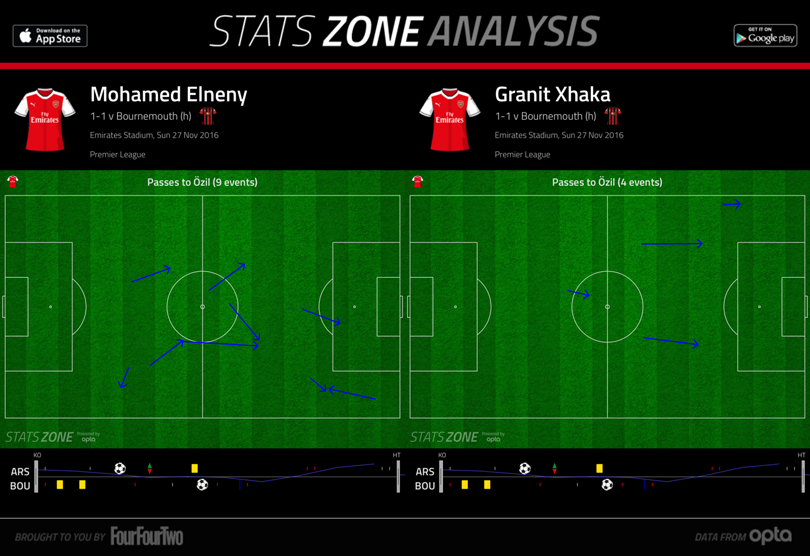
Bournemouth were what they are: hard-working, organised and capable of keeping the ball. They managed to tread the balance between ambition and security, but were often allowed to be much too comfortable in their own third. Arsenal explored those areas often without really penetrating them, and succeeded only in posing basic questions to the visiting centre-halves.
The difference provided by Cazorla, therefore, is in the temperament. A naturally two-footed player, well balanced and with velvet technique, the Spaniard brings diversity to the midfield and an ability to put the forward players – all of whom are blessed with great skill, pace, or both – into situations which leave defenders isolated. Without his ability to pick those holes, Arsenal invariably play slower, in a more formulaic way and consequently, either into the jaws of an opposing defence or impotently around its perimeter.
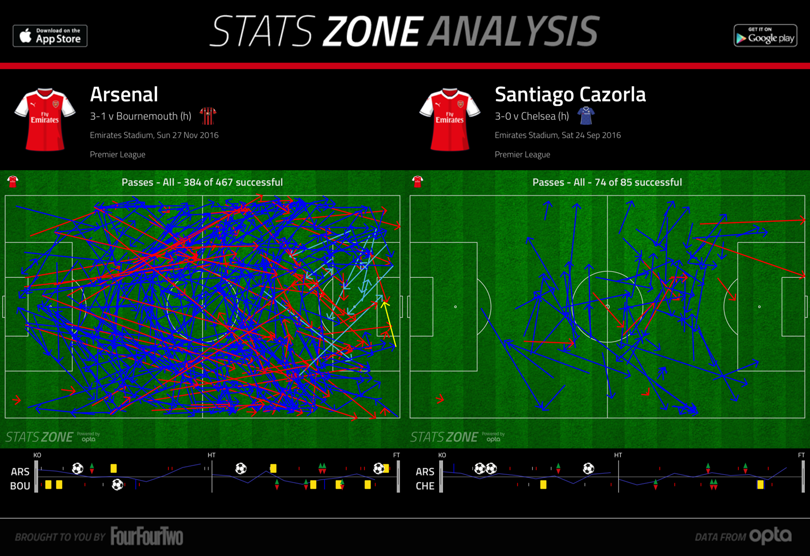
Win of champions?
It was a game they deserved to win and, on 90 minutes, Alexis tapped in a cutback from substitute Olivier Giroud. By that point, though, Bournemouth had begun to overcommit and were becoming increasingly exposed to the counter-attack. It allowed Arsenal to finish with a flourish and to create a few passages of play which drew and warranted warm applause, but that distracted from how blunt they mainly were.
Everything is relative in the Premier League, so for them to have had to rely on periodic Bournemouth charity was disheartening.
Winning is winning and this three points will do no harm at all to neither Arsenal's ambitions nor Wenger's troubling November averages. What it won't do, however, is assuage the doubts that exist over this squad's resilience – either in the emotional or technical sense.
With some spin, this was "the kind of game which champions win" and the sort of disjointed performance deemed irrelevant if it doesn't cost points. A more realistic appraisal, however, would claim it as one which showed Arsenal for what they are: an undeniably talented team, but one with demons to conquer and deficiencies to cure.
More analysis • New features you’d like every day on FourFourTwo.com
Seb Stafford-Bloor is a football writer at Tifo Football and member of the Football Writers' Association. He was formerly a regularly columnist for the FourFourTwo website, covering all aspects of the game, including tactical analysis, reaction pieces, longer-term trends and critiquing the increasingly shady business of football's financial side and authorities' decision-making.

